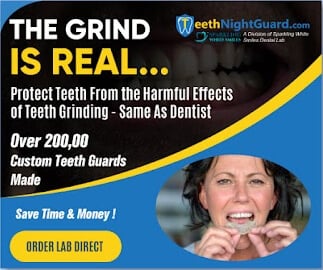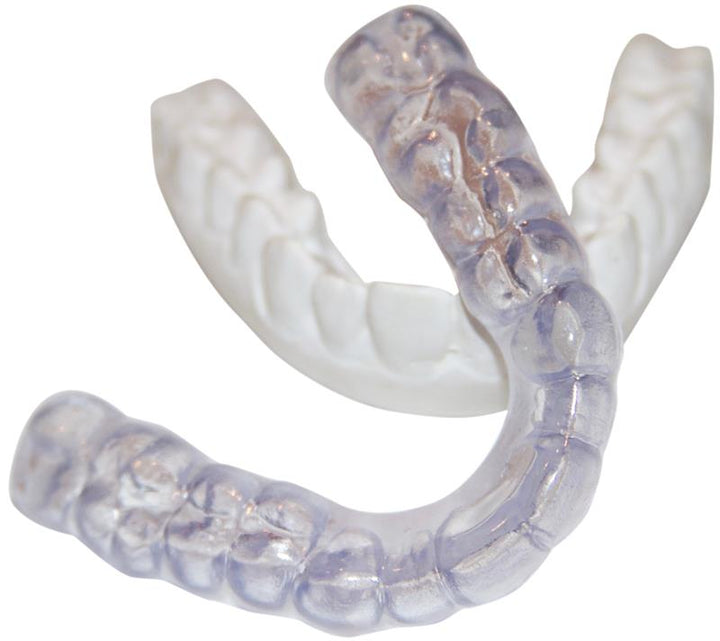If you grind your teeth at night, I hope you are wearing a night guard to protect them from wear and tear. And if you are, you will definitely notice that the wear and tear that would have damaged your teeth is now showing up on your night guard. I mean, that’s the whole reason that it’s there!
So, you might be wondering how long you can wear the same night guard before it’s too damaged to keep doing you much good. The answer depends on how well you care for it, what material it's made of, and how heavily you grind your teeth.
Let’s look at some averages and then cover tips for making your night guard last as long as possible.
You should likely replace your night guard every 6-9 months.
A night guard can help not only prevent tooth damage but also lessen headaches, jaw pain, and soreness, as well as decrease your chances of gum disease and recession. With all of those benefits, you want to make sure that you maintain your night guard’s effectiveness by replacing it as needed.
Like anything that wears out, an old and damaged night guard will simply not be doing the job that you need it to do. But many of us wear things past the point where they’re serving us. Think about the times you’ve worn a pair of shoes into the ground. The materials in those shoes were practically disintegrating, meaning the muscles and tendons in your feet were not getting the support they need.
You don’t want to skimp on something that supports your long term oral health. So, when you invest in a night guard, make sure you also budget to replace it every six to nine months. That’s a decent average to expect.
Look for signs of wear on your night guard.
Don’t just go by a set timeframe or wait until you start to feel pain in your mouth or see a giant crack in your night guard to consider getting a new one. You should also inspect your night guard regularly for any hairline cracks, for serious scratches and signs of abrasion, and for fraying material.
This is especially true if you are a heavy teeth grinder or you prefer night guards made of thinner and more flexible material. In those cases, your night guard will likely wear out more quickly than the average. So, it’s good to check it regularly rather than operating solely on a projected timeline.
If you are unsure what constitutes serious wear, bring your night guard with you to your next dental appointment. The dentist will have a look and let you know what to look for on your own. In fact, it’s always a good idea to bring your night guard with you to the dentist for feedback.
You can extend the life of your night guard by following these tips.
There are some steps that you can take to extend the life of your night guard.
First, make sure you are cleaning your night guard every day when you brush your teeth. And when you do so, avoid using an abrasive toothpaste or toothbrush on the night guard as this will contribute to wear.
Cleaning and fully drying your night guard every day will help prevent plaque buildup, which hurts the plastic (and contributes to tooth decay). You should also avoid exposing your night guard to anything sugary or acidic—either by eating or drinking with your night guard in or by putting your night guard in without thoroughly cleaning your teeth.
Once a week, you will want to deep clean your night guard with a night guard cleanser that will help to preserve the materials. And, finally, make sure you don’t forget about the case. Keeping your night guard in a dirty case will counteract all of the other cleanings you’ve gone to the trouble of doing. So, include your night guard case in your deep cleaning routine.
If you have braces, you will need to change night guards as your teeth shift.
If you are using braces to realign your teeth or bite, your custom night guard will stop fitting you well after a couple of adjustments. Continuing to force it onto your teeth can counteract the progress of your orthodontic work and also lead to damage (to your teeth, the braces, and the night guard).
So, pay attention to any difficulties you have putting the guard in or taking it out as well as any feeling of tightness or pinching while wearing it. If you experience any of those issues, it’s a good indicator that it’s time for a new guard.

When finished with your braces, use a night guard that is also a retainer.
Conventional retainers can be challenging to pair with a night guard. But did you know that you can get a night guard that is also an orthodontic retainer? This two-in-one package is great for anyone who’s worried about their teeth shifting back after all the progress made through wearing braces. You’ll definitely want to try out this option if you’re a teeth grinder who’s recently been through orthodontic treatment.
Visit TeethNightGuard for more information on fitting, pricing, and our 100% customer satisfaction guarantee.
JOIN OUR NEWSLETTER! RECEIVE PROMOTIONS & COUPONS FOR CUSTOM DENTAL NIGHT GUARDS
INTERESTED IN BECOMING AN AFFILIATE OF TeethNightGuard.com?
Earn 15% commission for simply sharing with your friends and family through email or social media such as Facebook, Reddit, or Twitter. Sign up and learn more here: https://www.teethnightguard.com/pages/register-affiliate-account
EXTRA DURABLE 3MM CUSTOM NIGHT GUARD - MAXIMUM DURABILITY AND COMFORT - MOST RECOMMENDED

$119.99
Item Number SWSPRO Manufacturer Sparkling White Smiles Dental Lab Rating Product Description Love this product? Share the product page link with Friends and Family. Simply copy the product page web address or this link: Custom Teeth Night Guard and post!… Read More